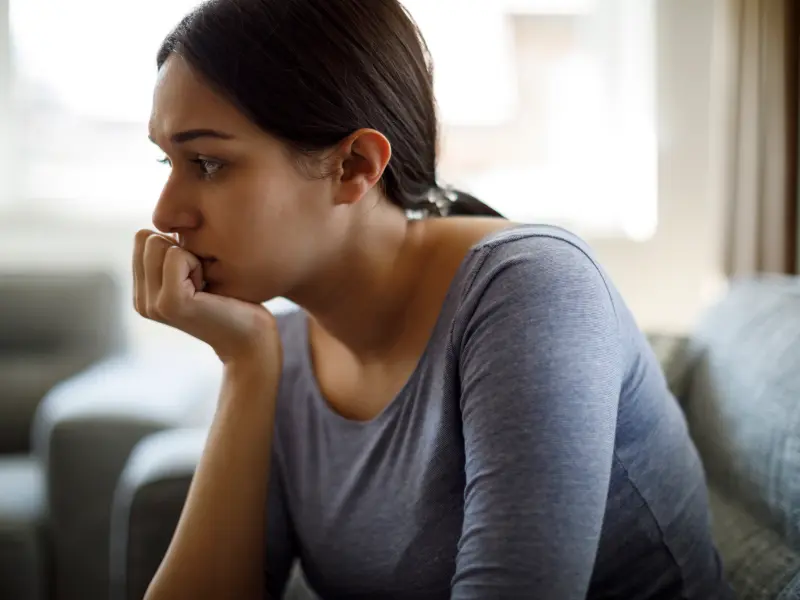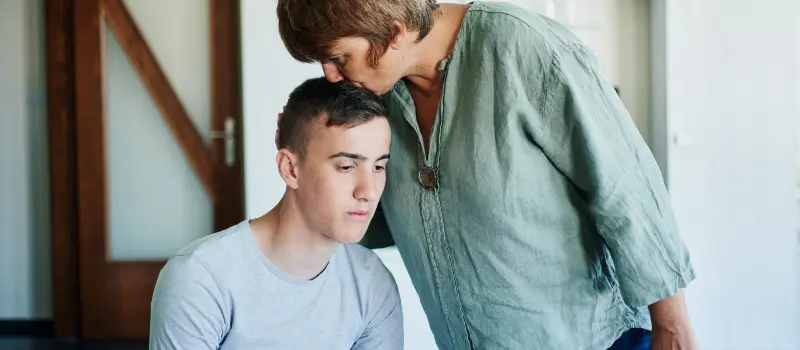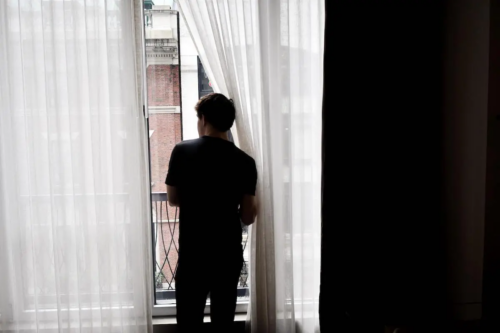
Table of Contents
Yes, Some Teens Have a Fear of Growing Up — Here’s How to Deal

Written By: Britt Brewer

Clinically Reviewed By: Dr. Don Gasparini
Updated: September 10, 2025
5 min.
The fear of adulting can have a significant impact on a young person’s life, affecting their relationships, ability to make future decisions, and more. Keep reading to learn how to cope.
Learn more about our Clinical Review Process
Table of Contents
Many young people face challenges transitioning into adulthood. However, hesitance isn’t the only factor hindering personal growth — often, struggling to grow up is a far more complex issue rooted in genuine fear and exacerbated by trauma. There’s a collective anxiety roiling a generation of young people saddled by student debt, rising housing costs, and an imminent climate crisis.
And it’s not just younger generations who’re doubtful about their future; most U.S. citizens agree that young adults are facing an uphill battle as they grow older, data shows. Below, we’ll go into what causes the intense fear of growing up, if it’s considered a mental health condition, and how to seek treatment for this fear and other phobias.

Growing up doesn’t have to be a source of anxiety
We offer online treatment programs for teens to help make the transition into adulthood easier.
Is the fear of growing up a mental health condition?
In short, no. A fear of growing up, also known as “adulting anxiety” or “adult-onset anxiety,” can be characterized by an inability or unwillingness to take on adult responsibilities and a tendency to resist the transition into adulthood. While the fear of adulting is not officially recognized as a diagnosable mental health condition, it can have a significant impact on a person’s life and executive functioning.
Young adults who experience this fear may find it hard to commit to relationships, struggle with financial responsibility, and often view making long-term plans or setting goals as overwhelming. Other common symptoms of the fear of growing up include:
- Feeling overwhelmed by or avoiding adult responsibilities, including cooking, paying bills, or managing paperwork
- Difficulty making decisions related to adulthood, like whether to move out of the family home, or commit to higher education
- Physical symptoms like tension, headaches, or stomach issues
- Worrying about finances and debt
- Struggling in relationships, including avoidance of long-term commitments, due to fear or insecurity
Fear of adulting vs aging phobia
On the other hand, an excessive fear of aging, or growing old, is known as gerascophobia. People who suffer from this mental health condition see the process of aging as a legitimate threat and will go to great lengths to slow down or hide growth. Gerascophobia is marked by symptoms like anxiety or distress related to birthdays, avoidance of discussions related to aging, preoccupation with health, and more. While the causes of the phobia are multifaceted, it can be exacerbated by factors like trauma and sexual abuse.
It should be noted, however, that phobias about entering adulthood and taking on adult responsibilities are in no way symptoms of gerascophobia — a condition concerned with a specific fear around the physical and biological act of aging. Also, it’s unclear if gerascophobia is anecdotally on the rise or just being discussed more in recent years. There’s a possibility people are becoming more aware of gerascophobia due to increased social media and internet usage, which may lead to more people seeking help for their fear.

What causes the fear of growing up?
As mentioned, the fear of growing up can stem from multiple sources, especially in our current day and age. Below are some common causes of the fear of growing up.
1. Past trauma
Past trauma, such as abuse or neglect during childhood or adolescence, can profoundly influence how someone views adulthood. These experiences may lead to deep-seated fears and insecurities, making it difficult to trust others or feel worthy of happiness. This view can contribute to fears about growing up, as individuals may fear that adulthood will bring more pain or disappointment.
2. Financial anxiety
The stress and worry about money, debt, and stability can contribute to the fear of growing up, including concerns about basic expenses, future security, and retirement savings. Debt adds to this anxiety, with the fear of paying off loans and interest feeling overwhelming. Job insecurity can worsen these worries, affecting sleep, mood, and overall well-being.
3. Social media
Social media’s detrimental impact on growth and development, especially among kids, teens, and young adults, is well-documented. Many reports link high social media usage to sleep disruption, ADHD, cyberbullying, and increased anxiety. Moreover, social media fosters a “culture of comparison,” leading to an obsession with self-image and unrealistic beauty standards, potentially resulting in mental health issues like higher rates of suicide. Recent studies have shown that heavy social media use during early adolescence predicts lower life satisfaction in subsequent years and can even affect brain development. These factors contribute to young people’s decreased satisfaction with life and their future outlook.

Every Adult Should Know How Social Media Impacts Youth Mental Health
Dr. Caroline Fenkel, DSW, LCSW
4. The COVID-19 pandemic
The COVID-19 pandemic exacerbated existing mental health issues among teens and young adults – an age group whose rates of depression and anxiety were already high even before the pandemic, according to a recent Surgeon General’s report. The pandemic’s massive fatality rates, alongside the constant drumbeat of death in the news, ratcheted up pre-existing anxieties, including death anxieties.
Also, separation anxiety in kids and young people ballooned when schools reopened and people returned to work. Depression and anxiety can cause people to have a gloomy outlook on the future and inhibit the kind of thought and action necessary for gaining independence and responsibility — two key tenets of emerging adulthood.
How to treat the fear of adulting
Treatment for the fear of adulting usually involves therapy and practical strategies to help manage fears and build confidence in handling adult responsibilities.
Therapy, like cognitive-behavioral therapy, helps challenge negative thoughts about adulting and develop coping skills. Exposure therapy gradually introduces tasks related to adult responsibilities to build confidence. Learning practical skills, like breaking tasks into smaller steps and setting realistic goals, can also help manage stress. Encouraging self-care habits like exercise and adequate rest also plays a role.
How Charlie Health can help
If a young person in your life is struggling with the fear of growing up, Charlie Health is here to help. Charlie Health’s virtual Intensive Outpatient Program (IOP) provides more than once-weekly mental health treatment for young people and families dealing with serious mental health conditions, including phobias. Our expert clinicians incorporate evidence-based therapies into individual counseling, family therapy, and group sessions. With this kind of holistic treatment, managing your mental health is possible. Fill out the form below or give us a call to start healing today.




